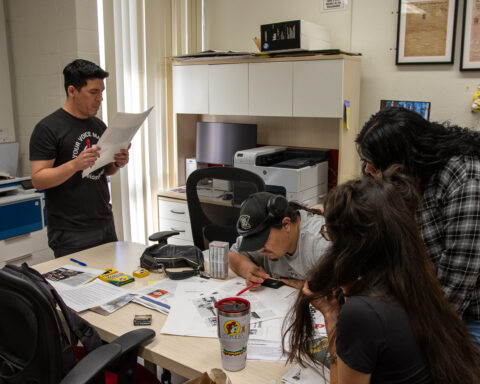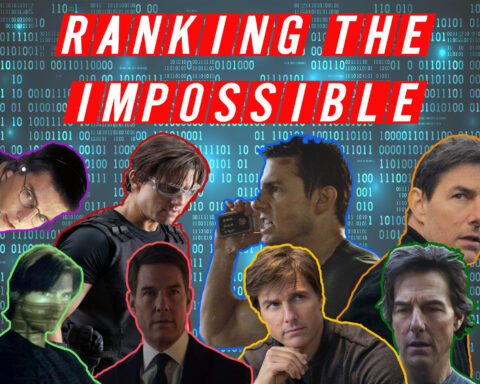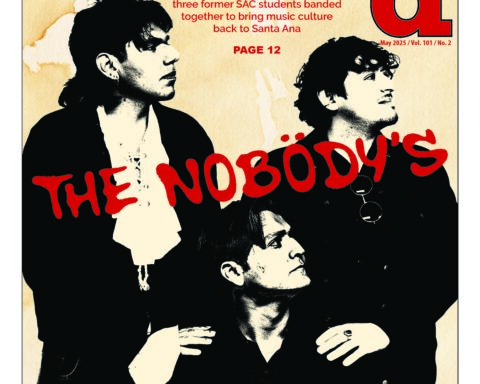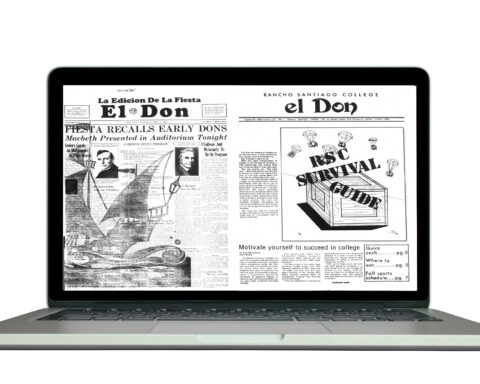Orange County based filmmaker and Santiago Canyon College alum, Braden Swope, is a testament to putting in hard work and reaping the rewards. After success with short films, he challenged his abilities by making a two-hour feature film, which is something he has never done before. He went all in, gambled on himself, bit off more than he could chew and continued chewing. With the help of a volunteer crew and his own ingenuity, the feature film was completed and became a success.
“Human Resources” is the story of an anxious young man who, after starting a new job at an eerie hardware store, uncovers a shocking mystery that leads to a fight against terrifying forces that lurk behind the walls. After two years of work, the film premiered at film festivals across the country. The film and crew went on to win multiple awards, give panel discussions, and gain notoriety. During our conversation, he gave me insight into who he is, his creative process, his filmmaking abilities, and much more:
Let’s start with an introduction. Please tell me about yourself. Who is Braden Swope?
Braden Swope is me, that’s for starters. I’m a local Orange County filmmaker. I’ve grown up here my whole life, I’ve never left and I don’t plan to leave unless that is to go to the big city, which is always inevitable for my field. I’ve been making shorts since I was very young. I’ve been experimenting and watching movies for as long as I can remember and ever since I attended the Santa Ana Orange County School of the Arts, I have been studying film and been very interested and invested, and it’s been a huge part of my life.
I made my first feature film when I was 19, in 2019, and ever since then, I’ve been prepping it to be ready. As of right now, we are prepping for our distribution process, which has been a long journey. For right now, I’m a freelance filmmaker and living down in Mission Viejo with my girlfriend and loving life. So, that’s me.
Tell me how you got into film. When did you know that this was something you wanted to pursue?
My brother and I would watch movies all the time and it’s sort of something that is second nature to me. Something that I can’t pinpoint as far as getting into film watching. But, filmmaking has an interesting history for me because my whole life I’ve been very interested in the internet and social media, YouTube especially. I’ve had probably 9 YouTube channels across the course of my life and never, of course, sparked any fame but still doing it for my enjoyment.
The moment that I got into film, knowing that I wanted to pursue it, was pretty late. I auditioned to go to the Orange County School of the Arts and I didn’t know it then. During my freshman year studying film, I wasn’t like, ‘This is totally me!’ It was hard. It’s a field that takes a lot of effort, dedication, and lack of sleep. So, you know, it’s scary. When I was confronted with this being the rest of my life, it was scary.
But, once I started to do it more and had some success with it, I realized that the highs of this industry are way better than any of the lows. That’s kind of a round-a-bout way of saying that it’s kind of always been there.
So the payoff, it would seem, is worth the stress.
Exactly. You kind of forget those hours once you’re premiering something or talking to a friend about it. You’re like, “Okay it was worth it at this point.” I have found a lot of joy there.
Which genre of films do you enjoy making the most? Were there any inspirations that got you into the genre?
It’s interesting because my feature film, Human Resources, is a horror movie. Before I made that movie I had never intentionally watched a horror film or been interested in it. So, before the days of making this feature film, it was always comedy. I’ve never gravitated towards drama or anything else. It’s always just been comedy. My brother and I grew up trying to be funny and put on skits and put on shows for people. It’s always been to make people laugh.
But, when it came to making a feature film, he and I had been very inspired by Jordan Peele’s film, “Get Out,” in 2017. It was something that shaped our movie watching because a lot of people now refer back to movies in the ‘70s and ‘80s when they were kids, that inspired them. Those were the types that were shown to me in film school. We felt that since “Get Out” was happening now, we had to make a movie like that.
At the same time, we had such big comedy roots that we didn’t want to box ourselves in with one genre. So, our movie sort of is a multi-genre piece. There’s a mystery backbone to it, a lot of comedy thrown in, and some drama scenes are in there. But, ultimately, it is a horror movie. Oh, and I just recently made a short film that is also a horror movie. So, I’m sort of enjoying what the medium of filmmaking can do when you’re working within the horror genre.
You briefly mentioned film school, which one did you attend?
When I say film school, I mean my experience. After I graduated from Orange County School of the Arts I attended Santiago Canyon College. They don’t have a film program there but they have some film classes, but nothing crazy. Those were more history of film classes. As I was going to college, I had this burning desire to make a feature film. It sort of substituted for my film school in a lot of ways because I was spending so much time just engrossing myself in film and making a movie, literally learning by trial and error from making a feature film.
A lot of my peers in film school have said that they wish they could’ve had an experience that way. So, I’m not advocating for one way or another, like going to film school or not. There are a lot of different paths that you can take as a filmmaker, but ultimately it was the making of my film that taught me what I refer to as skills.
I commend you for going the trial and error route. I think that some people buy into the indoctrination that you need to go to school to learn things. While going to school has its benefits, you’re proof that it’s not necessarily needed.
Thank you. I appreciate it. I think that art is such a weird thing to commodify into an industry. So, it’s hard to think of it as a career. Especially when it’s so close to your heart. I think I’m being way too pretentious at this point, but film indeed is one of those mediums that so many people can get into. There are a lot of ways to get into it and to get an understanding that people can take different paths.
You mentioned your recent short film a little bit ago, and that’s a unique story, isn’t it? You made it in your home during the COVID-19 pandemic, with the equipment you had on hand and with a $0 budget. Could you share how that came to be?
Sure. I was coming off spending so much time in quarantine as I cut my feature film myself. There were so many things that I had to do myself. It was a very gargantuan task. It’s a two-hour horror movie. I shot it over two months in the summer of 2019 and premiered it to over 200 of my closest friends and family. So, coming off of that, I was exhausted. I wanted to make something else but I didn’t know if I could exactly pull it off on my own instead of with the volunteer crew that I begged to help me with my feature film.
I thought of the smallest scale thing that I possibly could do and keep my sanity. My girlfriend, Penny, and I came up with the idea to make a short film here in the house. I had been watching, and here’s another reference of someone going from nothing to filmmaking glory, work by David F. Sandberg. He made the “Shazam!” movie. He started by making a horror short film on YouTube that got a ton of attention and then he got a studio deal. That was very inspiring. He makes very short, interesting, to the point horror movies and I was very inspired by him. I thought to myself, ‘If he can do this then I can do this, too’.
I used the gear that I had with me to make something small, with no budget, which I documented on TikTok. Unfortunately, people were flaming me in the comments. They didn’t feel like it was actually made for no money.
Along with directing, you also write, edit, and create sound effects for your films. Could you explain how your creative process works?
Oh, gosh. It’s hard. I’m very OCD in that way. It came as sort of a necessity when I don’t have a crew that can do this for me. Either I let my passion project die or I’m going to watch about 40 YouTube tutorials on how to use foley microphones and VFX tutorials. The creative process is always harkening back to trial and error. The best answer that I can give is it’s just trying. Make the worst stuff as soon as possible so you can move on to making some okay stuff, then move on to some decent stuff. You know, work your way up.
That’s a round-a-bout way of saying that it’s out of necessity. I didn’t set out thinking that I wanted to foley my feature film. It was two hours of footstep noises and I wasn’t looking forward to that, but I had to do it. I would advise people, whether it’s a lot of work or not, to dip their toes into every little corner of filmmaking if they want to be a director. It’s given me extra knowledge to understand how I can even direct someone in a sense of what I want from foley or VFX.
With “Human Resources” being your recent feature film, is it the biggest project that you’ve worked on? What was your role in its creation?
Yes, and I was the director, co-writer, co-producer, editor, VFX artist and it’s too much to list now. It was a lot of roles and a lot of long days having to motivate myself to keep working. As for the writing, my brother and I are very close and have a very close understanding of what we want out of our films. We worked through that script for so long, we went through so many iterations and got a lot of feedback.
We like to explore very bizarre and off-beat worlds. We’ll never make a movie where there isn’t something kind of quirky or weird going on. It’s just part of our style. But, yeah, I was in a lot of parts of the process from start to finish. We finished it in May of 2021 and finally premiered it to our cast and crew in August of 2021 at the Frida Cinema in Santa Ana, which is my favorite little indie theater.
Your films have received awards and have been premiered in LA and here locally in OC. How does it feel to see your hard work on display and be recognized?
This is, like, a two-sided conversation where I suffer from a lot of social anxiety and I’m a very extroverted person. But, whenever I go into highly intense social situations, I face a lot of anxiety. I think as I say that, someone might say I’ve picked the wrong industry because that’s the thing you need to be good at; socializing and networking. At the same time, I’ve had such incredible experiences getting feedback on the film and seeing it reviewed online.
At the Oceanside Film Festival, we did a 25-minute panel where one of the programmers asked us in-depth questions and he was a big fan of the movie. Those are the experiences that truly make it worth it. It’s so rewarding to just get to talk about someone picking up on the subtext of your film that’s never stated on screen and then they describe exactly the conversations that my brother and I had in the writing room. It’s crazy. That’s what this art form is meant to give you and it’s so rewarding for the soul.
Where can people watch your films? How can they also stay tuned in to what you’re working on?
For our feature, “Human Resources,” we are right in the middle of our sales process and I don’t have a time frame just yet. As far as the short films, and any of our behind-the-scenes endeavors, all you have to do is Google my name, and things will pop up.
If you go to our website, you can see all of our stuff. Our YouTube channel is NBD Productions. I’m on TikTok and Instagram with my name, Braden Swope.
Is there any advice that you would give to any aspiring creators? Any words of wisdom or solutions that you’ve learned along your journey?
Sure. There’s so much I can say but I don’t want to pretend that I have some wisdom. I’m only 22 and I haven’t experienced a lot of this world. As far as video content creation and filmmaking, I would say the only advice that I can strongly stand by is that you have to release what you make. You have to finish what you make. I don’t think I’ve felt a greater shame than seeing a project file for something I didn’t finish. I can’t even look at that stuff.
Nothing you ever make will be perfect, even if you’re given a decade to make it. People need to go out there and use the camera on their phones to shoot anything. Whether it’s a news segment, a short film, or a documentary. If you’re interested in video content creation, right now you have to be so attuned with getting it on the internet.
- Guitar ensemble assembles for the stage - May 18, 2022
- Q&A with Santiago Canyon College alum and filmmaker Braden Swope - May 7, 2022
- District makes masks optional indoors - April 21, 2022
















